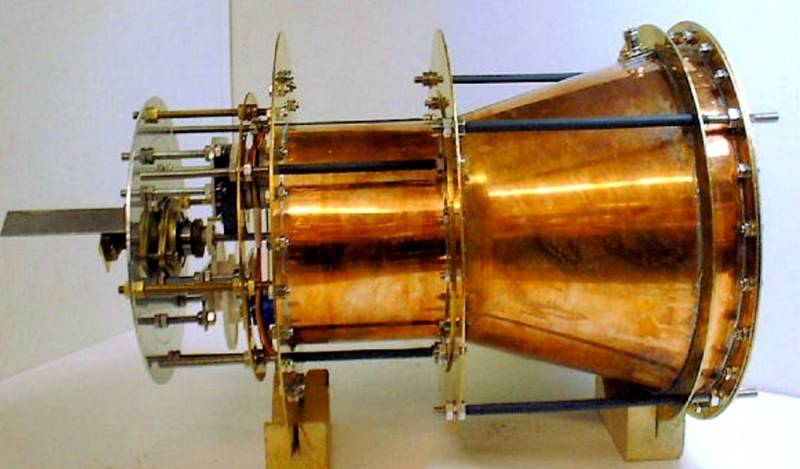Engine capable of refuting the laws of physics
British scholars who have become household names continue to amaze. In 1999, British researcher Roger Scheuer proposed the concept of a propulsion system, which may violate the law of conservation of momentum. An extraordinary project that could overthrow established scientific ideas was called EmDrive.
Outwardly resembling a bucket, the unusual engine consists of a magnetron and a resonator. The work of EmDrive is compared with the situation when a person sits in a box and pushes its walls from the inside. But instead of just swinging from side to side, the engine provides movement without spending either fuel or generating a directed beam of radiation. In the Russian Academy of Sciences, this invention of British scientists called "bluff".
But contrary to initial skepticism, Scheuer's invention worked in the hands of NASA scientists and their Chinese colleagues. The American physicist Bryce Cassenti believes that the British engine cannot violate the laws of the Universe, and, most likely, its functioning is explained by effects that are simply unknown to science. Final verification can only be carried out in outer space, where extraneous influencing factors will be excluded. Chinese scientists are preparing to test their clone EmDrive directly in space.
In the homeland of the invention in the UK, a group of scientists was given a grant of $ 1,8 million to test the theory of “quantum inertia,” which could explain the EmDrive phenomenon.
Outwardly resembling a bucket, the unusual engine consists of a magnetron and a resonator. The work of EmDrive is compared with the situation when a person sits in a box and pushes its walls from the inside. But instead of just swinging from side to side, the engine provides movement without spending either fuel or generating a directed beam of radiation. In the Russian Academy of Sciences, this invention of British scientists called "bluff".
But contrary to initial skepticism, Scheuer's invention worked in the hands of NASA scientists and their Chinese colleagues. The American physicist Bryce Cassenti believes that the British engine cannot violate the laws of the Universe, and, most likely, its functioning is explained by effects that are simply unknown to science. Final verification can only be carried out in outer space, where extraneous influencing factors will be excluded. Chinese scientists are preparing to test their clone EmDrive directly in space.
In the homeland of the invention in the UK, a group of scientists was given a grant of $ 1,8 million to test the theory of “quantum inertia,” which could explain the EmDrive phenomenon.

Information